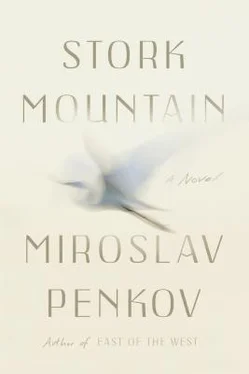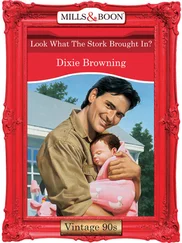Miroslav Penkov - Stork Mountain
Здесь есть возможность читать онлайн «Miroslav Penkov - Stork Mountain» весь текст электронной книги совершенно бесплатно (целиком полную версию без сокращений). В некоторых случаях можно слушать аудио, скачать через торрент в формате fb2 и присутствует краткое содержание. Год выпуска: 2016, Издательство: Farrar, Straus and Giroux, Жанр: Современная проза, на английском языке. Описание произведения, (предисловие) а так же отзывы посетителей доступны на портале библиотеки ЛибКат.
- Название:Stork Mountain
- Автор:
- Издательство:Farrar, Straus and Giroux
- Жанр:
- Год:2016
- ISBN:нет данных
- Рейтинг книги:4 / 5. Голосов: 1
-
Избранное:Добавить в избранное
- Отзывы:
-
Ваша оценка:
- 80
- 1
- 2
- 3
- 4
- 5
Stork Mountain: краткое содержание, описание и аннотация
Предлагаем к чтению аннотацию, описание, краткое содержание или предисловие (зависит от того, что написал сам автор книги «Stork Mountain»). Если вы не нашли необходимую информацию о книге — напишите в комментариях, мы постараемся отыскать её.
Stork Mountain — читать онлайн бесплатно полную книгу (весь текст) целиком
Ниже представлен текст книги, разбитый по страницам. Система сохранения места последней прочитанной страницы, позволяет с удобством читать онлайн бесплатно книгу «Stork Mountain», без необходимости каждый раз заново искать на чём Вы остановились. Поставьте закладку, и сможете в любой момент перейти на страницу, на которой закончили чтение.
Интервал:
Закладка:
“Elif’s father?” I said. “How is he involved?”
Without giving it much thought we had both brought our checkers to the home boards. A curious battle was about to unfold — whoever rolled the better dice would bear off first. No strategy or skill — just luck. I rolled a one and a two, collected the measly checkers. Grandpa rolled a pair of threes, grabbed a handful, then rolled again. In no time he’d borne off half of his checkers. And in no time I’d found myself, once more, behind.
The imam worked for the contractor. Not officially, of course, but he had been paid. His job was to put pressure on Grandpa, to get him to sign an agreement. The Bulgarian hamlet was full of ghosts, the imam had said, but the Muslim quarter was full of the living: men, women, and children. The wind farm would bring investments to Klisura, a fresh, new life.
“And he is right,” Grandpa said. “The people of Klisura will benefit from the farm.”
“But you don’t care for the people?”
“My boy,” he said through his teeth. “I don’t expect you to understand.”
I really didn’t. Besides, what was there to understand? He’d swapped our land — beautiful, fertile fields that could have delivered me from debt — for heaps of rock and bramble, for desolate and ruined houses. And why? To save the memory of people long dead — the idiot Vassilko, the mayor, the village priest. I didn’t know these men. I didn’t care to know them. They were strangers whom Grandpa had chosen over me, his flesh and blood. He’d preserved the dead and betrayed the living — and not just me, his grandson, but also the people of the Muslim hamlet, who stood to profit from a wind farm.
My heart was racing. I picked up the dice and rolled a pair of sixes. Grandpa blinked in disbelief while, with a shaking hand, I bore off almost all of my remaining checkers. I was an inch away from beating the old man. My rightful indignation was manifesting itself, if not in real life then at least upon the backgammon board. I rolled the dice so hard one popped out on the table, hit the jar, and bounced back. With a magnanimous wave, Grandpa allowed me to roll again. I did: an unfavorable value. I moved two checkers, but bore off none.
“They’re all waiting,” he said. “Hoping for me to die so they can seize my land. So let them wait.” A large, contented grin stretched his lips and quickly turned to laughter. He had rolled a pair of sixes. The game was over. He’d won again.
I grabbed the jar and drank it dry. Another loss, another disappointment. And while I was refilling the jar from the earthen jug at my feet, the imam began to sing for the evening prayer. His voice enveloped Klisura like a fishing seine and I could almost feel its knots thick, inescapable against my skin.
Lightly Grandpa closed the board; lightly he took my hand. His was as cold as well water. “My boy, with your arrival a favorable die was cast. The question now is who will play it?” Then he lit a new cigarette, stretched back in his chair, and smoked.
FIVE
TWO WEEKS AFTER I first set foot in Klisura, the storks returned.
I was dreaming of America again. In my dream I was back in my apartment, back in my bed. I wanted to sleep but couldn’t. The tree outside my window was heavy with chirping birds, and the harder I pressed the pillow against my skull, the louder they screamed. “A good man has died,” someone said in English beside me. “They’re letting you know.”
It was the girl from the station, the one who’d cut her wrist. She was naked, except for her face, hidden behind the sheet as if behind a headscarf. Beautiful roses began to blossom across the sheet, each petal the color of dark blood. “Who is the man?” I asked her. “Who has died?” She started laughing. Her voice was muffled, as if coming from deep underground. I knew I’d made a mistake. She wasn’t the girl I thought she was. “You know the man, amerikanche ,” she said in Bulgarian. “Now hear the birds.”
I awoke startled, with the sun in the top corner of the window. The room was stuffy and the Rhodopa blanket soaked with my sweat. For a long time, eyes closed, I tried to shake off a dream so vivid I could still hear the girl’s laughter, the screaming of the birds. A dull, anxious heaviness settled in my stomach and I rushed out for Grandpa.
He was smoking on the terrace, leaning against the banister. “Good afternoon, sleeping beauty,” he greeted me, but didn’t turn. “Don’t you know there is no memory from sleep?” Then he pointed the tip of his fuming cigarette at the sky. In his mind, this moment allowed no room for words.
High up above the ruined houses, a dozen storks spun their wheels. Some glided clockwise, others counter. They called to one another, shrill, loud screams.
Grandpa kept quiet. He smoked his cigarette and watched the storks and I couldn’t tell if his old, tired face showed joy and pleasure or worry and regret. But when he turned to me his eyes glistened like a child’s.
“The storks are here,” he said.
He’d brought a bottle of rakia and two small glasses, which now he filled to the brim. “I’ve lived to see them one more year.”
We drank bottoms-up, to welcome.
* * *
These were the scouts. The first of a giant flock of white storks that would arrive in waves. It was the old birds who returned home first. The males. Then came the females. And finally, a few days later, arrived the young.
Their home was here in Europe; here were the nests in which their babies hatched. But when the end of August neared, the storks flew south to Africa, where they waited out the winter months, from Egypt to Cape Town. Once it was time to fly back home the storks gathered in the savanna and in flocks of thousands headed north. Some chose a western route, but most took the eastern: they tracked the valley of the Nile, traversed the Levant, and crossed the Bosphorus from Turkey. And then it was the Via Pontica they followed — that ancient Roman road along the Black Sea, which started in Constantinople and continued north into Bulgaria: the towns of Sozòpol, Burgas, and then Nessebar. It took the white storks fifty days to make their journey.
Why didn’t they fly over the Mediterranean? To conserve their energy, the storks depended on thermal columns, and thermal columns formed only over firm land. The sun warmed the ground, which in turn warmed the air above it. The warmer air expanded and rose and with some steady wind these thermal columns aligned in rows to form a highway. It was these thermals the storks used as lifts, this highway that they traveled. Three-quarters of all European white storks flew over Bulgaria. Two hundred and fifty thousand birds.
They flew the days and rested at night. There was this place near Burgas, Poda — caught between the sea on one side and three giant lakes on the other — that Grandpa had gone to visit last year. By the time he completed his hike the sun had set. All night, huddled in a blanket on the ground, he heard the clattering of bills, could hardly sleep from the excitement. He saw them with the dawn. Hundreds of thousands of storks and pelicans and cranes and herons and ibises and egrets and other birds whose names I’d never heard before. When the storks rose, the sun vanished, the sky disappeared, the earth dissolved, and only sound remained. By that time Grandpa was weeping like a little girl with fury. Furious, he threw his peaked cap to the ground; furious, he stomped on it. To hell with this life, he told himself. How many years had he lived and never seen a thing so pretty as the sound of rising storks at dawn? And how many other beauties would go unseen?
Now on the terrace we watched the sky. Before the day was over, three more waves of birds had arrived like a chaotic school of fish, spinning in opposite directions, passing so very close to one another. Some were here to rest; others had returned to their homes. One after another the nests on the ruined houses were filled with storks — a single bird for every nest. At once the repairs began: the sticks were rewoven and new ones were brought to reinforce the walls and bases. I felt the need to tidy up our yard.
Читать дальшеИнтервал:
Закладка:
Похожие книги на «Stork Mountain»
Представляем Вашему вниманию похожие книги на «Stork Mountain» списком для выбора. Мы отобрали схожую по названию и смыслу литературу в надежде предоставить читателям больше вариантов отыскать новые, интересные, ещё непрочитанные произведения.
Обсуждение, отзывы о книге «Stork Mountain» и просто собственные мнения читателей. Оставьте ваши комментарии, напишите, что Вы думаете о произведении, его смысле или главных героях. Укажите что конкретно понравилось, а что нет, и почему Вы так считаете.











